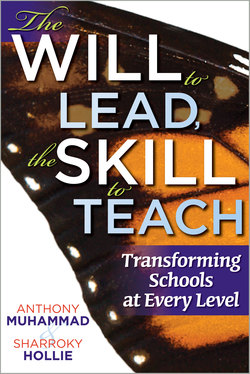Читать книгу Will to Lead, the Skill to Teach, The - Anthony Muhammad - Страница 10
На сайте Литреса книга снята с продажи.
ОглавлениеThree
Frustration in a Toxic Culture
Highly frustrated staff is a highly ineffective staff. School staffs made up of members with high levels of frustration soon develop into toxic cultures, making the job of serving the needs of all students nearly impossible. School leaders and practitioners concerned with improving schools must understand the effect of frustration on school culture and professional practice.
What is frustration, and why is it so damaging? Frustration is the feeling of anxiety we get as a result of our inability to accomplish a task or fulfill a want or need. There is a gap between our desired outcome and the results we achieve. In schools, our desired outcome is universal student achievement. This is not a wish, but a requirement. In the United States, No Child Left Behind dictates that students must achieve better learning outcomes or schools risk losing self-governance and funding (Kopkowski, 2008). Educators are being asked to do things that they may not be prepared to do (Kennedy, 2005), such as ensuring student mastery of a complex curriculum, classroom management, formative assessment and data analysis, and academic interventions. A 2006 survey of American teachers found that 58 percent felt that these requirements were impossible to meet (Feller, 2006). Mandating outcomes in an environment in which educators may not have the skills to reach those outcomes can lead to several problems, including lowering academic standards and cheating on standardized tests (Dewan, 2010).
We must start to examine and fix the factors that lead to high levels of educator frustration. Pressuring people to do things that they do not know how to do will not improve productivity. This approach has only created a revolving door of educators in the schools that most need consistent, compassionate, and skilled educators (Sparks, 2002).
Insufficient Preparation
It is difficult for teacher preparation programs to simulate all of the conditions that a new teacher will face in the classroom (Moir, 2008). This lack of proper preparation can easily be linked to low job satisfaction and high teacher turnover (Associated Press, 2003).
A future teacher who is well versed in general theory will not necessarily have the specific skills needed for diverse classroom situations. Other fields, like medicine and law, recognize the importance of specialization of knowledge and the practice of specialized skills. A doctor not only has to complete a course of study, but he or she also must engage in daily practice—an internship and a residency— and pass special board examinations to be licensed to practice. An attorney must also spend years completing a similar battery of specialized practice and then must pass a comprehensive examination before being licensed. We are not suggesting that a person needs eight years of practical experience before becoming an educator; rather, we believe future educators must experience more specific development both inside and outside of teacher education programs to reduce potential frustration once they enter the classroom as professional teachers. Teachers who teach underserved students, for example, often enter the field without proper knowledge of how to best engage and reach these students. We will address this issue of responsive instruction in the second half of the book.
In one study of new teacher experiences (Kopkowski, 2008), five primary areas of dissatisfaction that cause high levels of frustration emerged:
1. Lack of support
2. Student discipline issues
3. Low pay
4. Lack of influence regarding school operations
5. Lack of respect from colleagues, administration, and parents
It is easy to understand why any person confronting all of these issues at one time would become frustrated. These unexpected barriers are overwhelming to new teachers as well as experienced educators.
One additional area that is not addressed significantly during teacher preparation is training in multiculturalism. Achievement data shows that students who have teachers from similar ethnic and socioeconomic backgrounds as themselves perform better than students who have teachers from different ethnic and socioeconomic backgrounds (Viadero, 2008). A careful analysis of school achievement data from 1950 to 2000 shows that students who are White and middle class outpace other students who are non-White and impoverished in all tested academic areas (Gordon, Piana, & Keleher, 2000). A U.S. Department of Education (2005b) report titled Eight Questions on Teacher Recruitment and Retention: What Does the Research Say? reported that “it would be ideal if every teacher taught in an environment that matched his or her skills, background, and temperament. This is a particularly serious problem for low-income and minority students” (p. 17).
